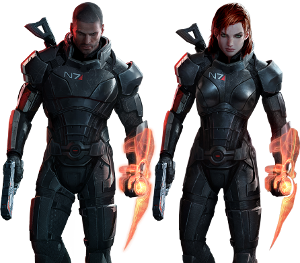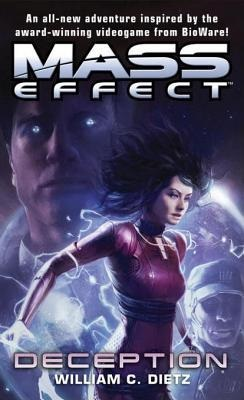
Drew Karpyshyn is a Canadian video game scenario writer, scriptwriter and novelist. He served as a senior writer for BioWare's Star Wars: Knights of the Old Republic and lead writer for the first two Mass Effect video games. He left BioWare in 2012 to focus on his Chaos Born novels, and returned to it three years later in 2015. On March 9, 2018, he announced he was leaving BioWare once again to pursue his independent work.

Mass Effect: Revelation is a science fiction novel by Drew Karpyshyn, who was the lead writer of the Mass Effect series. Published in 2007 by Del Rey Books, it is the first novel set in the Mass Effect universe, and the prequel to the Mass Effect video game by BioWare.

The quarians are a fictional extraterrestrial humanoid species in the Mass Effect multimedia franchise developed by BioWare and published by Electronic Arts. The quarians and their backstory are introduced in the first Mass Effect through the companion character Tali'Zorah, with quarian society as a whole playing a more prominent role in its sequels.

Commander Shepard is the player character in the Mass Effect video game series by BioWare.

The Reapers are a fictional fleet of sentient starships that serve as the main antagonists of the Mass Effect trilogy. The design of the Reapers was inspired by H. P. Lovecraft's Cthulhu Mythos deities. Within the series, the Reapers cause galactic-level mass extinctions every fifty-thousand years. The Reapers and their technology are capable of brainwashing organic life through a mind control process called indoctrination. The Reapers employ servants who are often altered into synthetic-organic life forms.

Mass Effect 3 is an action role-playing video game developed by BioWare and published by Electronic Arts. The third major entry in the Mass Effect series and the final installment of the original trilogy, it was released in March 2012 for Microsoft Windows, Xbox 360, and PlayStation 3. A Wii U version of the game, entitled Mass Effect 3: Special Edition, was later released in November 2012. The game is set within the Milky Way galaxy in 2186, where a galactic civilization is invaded by a highly advanced machine race of synthetic-organic starships known as Reapers. It concludes the story of Commander Shepard, an elite human soldier who is tasked with forging alliances between species for the war.
Mass Effect is a military science fiction media franchise created by Casey Hudson, Drew Karpyshyn and Preston Watamaniuk. The franchise depicts a distant future where humanity and several alien civilizations have colonized the Milky Way galaxy using technology left behind by an advanced precursor civilization.

Mass Effect: Redemption is a four-part comic book mini-series. Set in the Mass Effect universe, Redemption takes place two years before the events of the video game Mass Effect 2.

Mass Effect: Retribution is a science fiction novel by Canadian writer Drew Karpyshyn set in the Mass Effect universe. It is a sequel to the video game Mass Effect 2, as well as to its prequel novel, Mass Effect: Ascension, also written by Karpyshyn. Retribution is set directly after the events of Mass Effect 2, and like its predecessors, expands on the Mass Effect universe by fleshing out its setting and providing background on some key characters.

Miranda Lawson is a fictional character in the role-playing video game series Mass Effect by BioWare. In it, Miranda is an officer of the pro-human group Cerberus, first appearing in the 2009 iOS game Mass Effect Galaxy, and then serving as a squadmate in Mass Effect 2. In addition to these, the character also makes an appearance in the Mass Effect: Redemption comic series, in Mass Effect 3 if she survived the events of the suicide mission in Mass Effect 2, and in issues 5, 6, 8 and 9 of the Mass Effect: Foundation comic series. She is revealed to have been genetically designed by her father, Henry Lawson, to be perfect, and ran away from home to join Cerberus.

Mass Effect: Deception is a novel by writer William C. Dietz set in the Mass Effect universe. Published in 2012 by Del Rey Books, it is the fourth novel set in the Mass Effect universe, and continues the story of the previous three novels. Deception is notable for the negative reception from fans of the Mass Effect series, which prompted significant coverage from media outlets. In response to the negative reception, BioWare announced in February 2012 that they intended to revise the novel's content for future editions of Deception. No rewrite has been announced or published ever since.

The Illusive Man is a fictional character in BioWare's Mass Effect video game franchise. He is the leader of the pro-human group Cerberus. The Illusive Man wears an open suit that connotes both futuristic style and the "casual swagger of a charming billionaire". His eye implants make him appear slightly inhuman. He is normally seen in an empty office with no indication of his living arrangements. He is voiced by Martin Sheen.
Kaidan Alenko is a fictional character in BioWare's Mass Effect franchise, who acts as a party member in the first and third games in the series. The character is initially introduced in the original Mass Effect as a human Systems Alliance Officer and primary squad member in Commander Shepard's team. Kaidan's fate on the planet Virmire is part of a pivotal decision which the player has to make in order to advance the narrative.
Legion is a character in BioWare's Mass Effect franchise. The character first appears in Mass Effect 2 as a party member. After Mass Effect 2, Legion returns in Mass Effect 3 as a supporting non-player character. Legion is voiced by American actor D. C. Douglas.

Jack is a fictional character in the role-playing video game series Mass Effect by BioWare. Jack appears as a squadmate in Mass Effect 2, and may appear in Mass Effect 3 as a supporting character provided she survives the events of the previous game. Jack is voiced by Courtenay Taylor. Within the series, Jack was orphaned at an early age and was kidnapped by the anthropocentric paramilitary group Cerberus to be exploited as a test subject. Designated Subject Zero by Cerberus, she is considered to be one of the most powerful human biotics in existence in the Mass Effect trilogy as the result of unethical experiments conducted by Cerberus to enhance human biotic ability, though her traumatic experiences have molded her into an antisocial and psychopathic individual.
Tali'Zorah, or Tali in short, is a fictional character in BioWare's Mass Effect franchise, who serves as a party member in all three games in the Mass Effect trilogy. She is of the quarian alien race. Within the series, she is a skilled technician and the daughter of Rael'Zorah, a member of the quarian judicial review Admiralty Board. Ash "Liz" Sroka voices Tali in each of her appearances. Outside of the trilogy, Tali appears in Mass Effect: Homeworlds, a comic series with individual issues on each of several Mass Effect 3 squadmates.

Dr. Liara T'Soni is a fictional character in BioWare's Mass Effect franchise, who serves as a party member in the original Mass Effect trilogy. She is an asari, a female-appearing species from the planet Thessia who are naturally inclined towards biotics, the ability to "manipulate dark energy and create mass effect fields through the use of electrical impulses from the brain". Within the series, Liara is noted for being the galactic scientific community's foremost expert in the field of Prothean archaeology and technology, specifically evidence concerning the demise of the ancient Protheans, believed by the galactic community to be the pre-eminent civilization in the Milky Way galaxy until their sudden disappearance fifty thousands years before the events of the first Mass Effect.

Mass Effect 3: Omega is a major downloadable content (DLC) pack developed by BioWare and published by Electronic Arts for the 2012 action role-playing video game Mass Effect 3. It was released for Microsoft Windows, PlayStation 3, and Xbox 360 on November 27, 2012, with a delayed release in Europe on the PlayStation 3 platform set for November 28, 2012. The pack follows Commander Shepard and the asari pirate queen Aria T'Loak as they attempt to liberate the space station Omega from the anthropocentric terrorist group Cerberus. Omega expanded beyond the developers' original plan during its development cycle, both in response to a mandate of freedom by BioWare management and as a result of the development team's desire to develop the experience they wanted, and incorporates cut content from the main game.

The Mass Effect: Andromeda book series consists of a trilogy of science fiction novels based on the Mass Effect series of video games. The books in the series are Nexus Uprising (2017), Initiation (2017), and Annihilation (2018). All three books are released in paperback, e-book, and audiobook. The audiobook formats of Nexus Uprising and Initiation are narrated by Fryda Wolff, the voice of Sara Ryder, while the Annihilation audiobook is narrated by Tom Taylorson, the voice of Scott Ryder.















